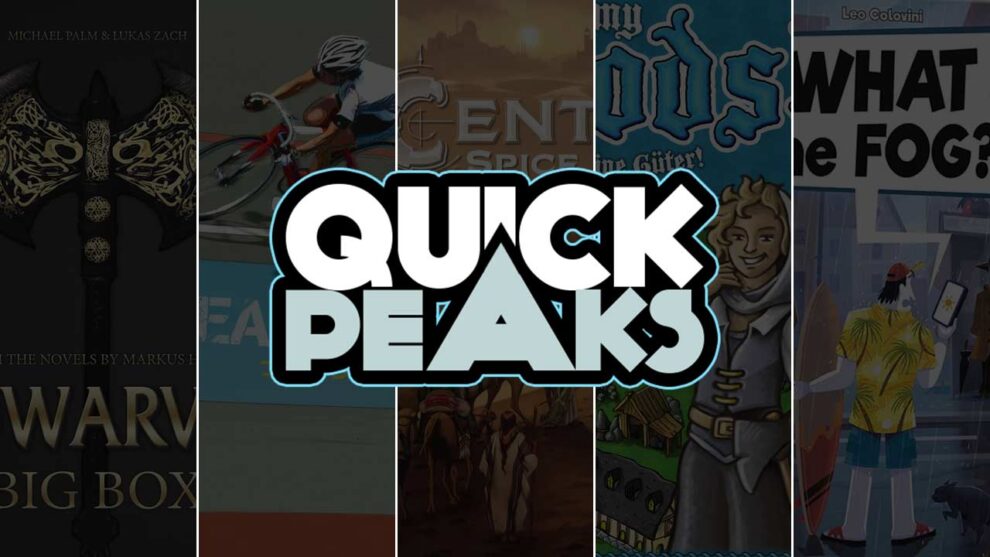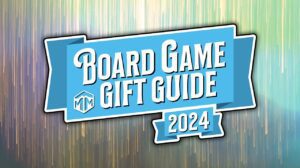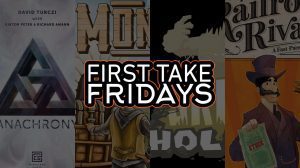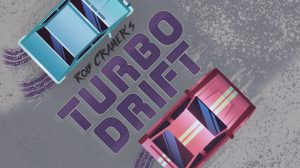The Dwarves: Big Box – Andy Matthews
Up until 2022, I’d never heard of The Dwarves, a hugely popular German five book fantasy series, which spawned a video game and a board game. And I certainly never expected to play it. But my game group wanted to inject some cooperative action into our game nights and The Dwarves was picked.
The goal of The Dwarves is to work your way through a scenario deck of cards, while protecting your lands from invading orcs, trolls, and elves. Players may also complete side quests which can provide valuable bonuses or cause trouble in Girdlegard (the dwarven homeland). At the beginning of every player’s turn the hero marker advances can trigger new enemies to emerge, cause drama in the dwarven high council, or cause negative effects to the side quest deck. In typical coop game fashion there are multiple ways to lose, but only one way to win.
My group had a good time playing The Dwarves, and even spent some time afterwards talking about different approaches we might take in our next play. While I don’t think The Dwarves is going to win any awards, it’s a solid game and one we’ll be playing again.
Ease of entry?:
★★★☆☆ – There were a few questions
Would I play it again?:
★★★★☆ – Would like to play it again
Read more articles from Andy Matthews.
Breaking Away – Tom Franklin
This obscure, self-published game from 1991 was picked up for Japanese distribution (only) by New Order Games in the early 2000s. Your four-member bicycle team is racing other four-member teams in a 2.5 lap racing track. You’ll start with three options for each biker’s movement points; movement in subsequent turns is determined by the placement of each biker in the pack of racers. If you’re in the lead, you only get a value of 3. The further back in a solid pack of racers, the higher your number.
You’ll likely want to save your bigger numbers to Break Away from the back at the halfway point to score points ahead of your opponents.
Even though there’s no 1970’s movie tie-in, this was far more fun and competitive than I expected. (Luckily, the designer is still selling it!)
Ease of entry?:
★★★☆☆ – There were a few questions
Would I play it again?:
★★★★★ – Will definitely play it again
Read more articles from Tom Franklin.
Century: Spice Road – K. David Ladage
I love Splendor. After being introduced to Century: Spice Road, I was informed that this game is often called the “Splendor Killer” and I can see why. There are notes within the game where you can see some similarities (it also has similarities with Concordia, in the way the action cards are used and recycled).
In the end, you can see where Century: Spice Road could, in some ways, be seen as superior. For example, the end-game trigger is more satisfying (e.g., a number of face-down point cards as opposed to a specific number of points), and the engine needed to move from one type of resource to another can be more interesting in how you set it up (e.g., each merchant handles different types of trades, and so you need to look at how each of those cards can work toward your current and next goals).
So is it the better game? The short answer is no. Both games, despite their similarities, scratch very different itches. Having one would not cause me to consider eliminating the other from my collection. I had a great time with this game and will likely seek out playing it again.
Ease of entry?:
★★★★☆ – The odd bump or two
Would I play it again?:
★★★★★ – Will definitely play it again
Read more articles from K. David Ladage.
Oh My Goods! – David McMillan
Oh My Goods! has been on my radar for years but, for reasons I cannot define, I never pulled the trigger on buying it. It’s a good thing I waited because earlier this year, I was able to pick up the base game and the two expansions for a ridiculously low price. And then it sat there on my shelf, unplayed, until this past weekend. I wish I’d played it much earlier.
Oh My Goods! (designed by Alexander Pfister) is a pure care game featuring multi-purpose cards. In the game, the players take on the roles of artisans producing products and then selling those products for profits. Depending on how you use them, the cards are either buildings waiting to be constructed, resources used to help those buildings produce goods, or the goods themselves.
During a round of play: players add some new cards to their hand, open the market by flipping over some cards to reveal the resources available for doing things, assigning their workers to buildings, flipping over some more cards, and then producing goods and constructing even more buildings. Each building produces a specific type of good and each unit of that good is worth a specific amount of money. Some buildings are able to use products from other buildings to produce upgraded, and more expensive goods, which the game calls ‘production chaining’.
In the two games that I played this past weekend, production chaining was the single aspect of the game that caused the most consternation, which is a little frustrating as it is, arguably, the most important aspect of the game. However, once you’ve seen a production chain in action a few times, the concept begins to make sense.
I’ve really enjoyed this game thus far and look forward to many more plays of it in the future.
Ease of entry?:
★★★★☆ – The odd bump or two
Would I play it again?:
★★★★★ – Will definitely play it again
Read more articles from David McMillan.
What the Fog? – Tom Franklin
How well can you predict how well you can predict the weather? Or, maybe it’s how well you can bend a weather prediction to match the cards in your hand—while other players are trying to do the same thing?
Players are dealt a hand of cards then, on a turn, must choose the topmost weather condition from one of three piles and place it on one of the daily weather maps. There are five weather conditions, and chances are, you’ll always be missing one or two of them in your hand. As the four slots per day are filled, everyone bids on how many days they will score the most points on—points are scored for the number of each weather condition card you have in your hand that matches each day.
Played over four rounds, with each round adding cards to your hand and days on the table, What the Fog? played easily, once we got the hang of it. Scores were single-digit low and there was no player interaction, making it far from memorable.
Ease of entry?:
★★★☆☆ – There were a few questions
Would I play it again?:
★★☆☆☆ – Would play again but would rather play something else














Add Comment